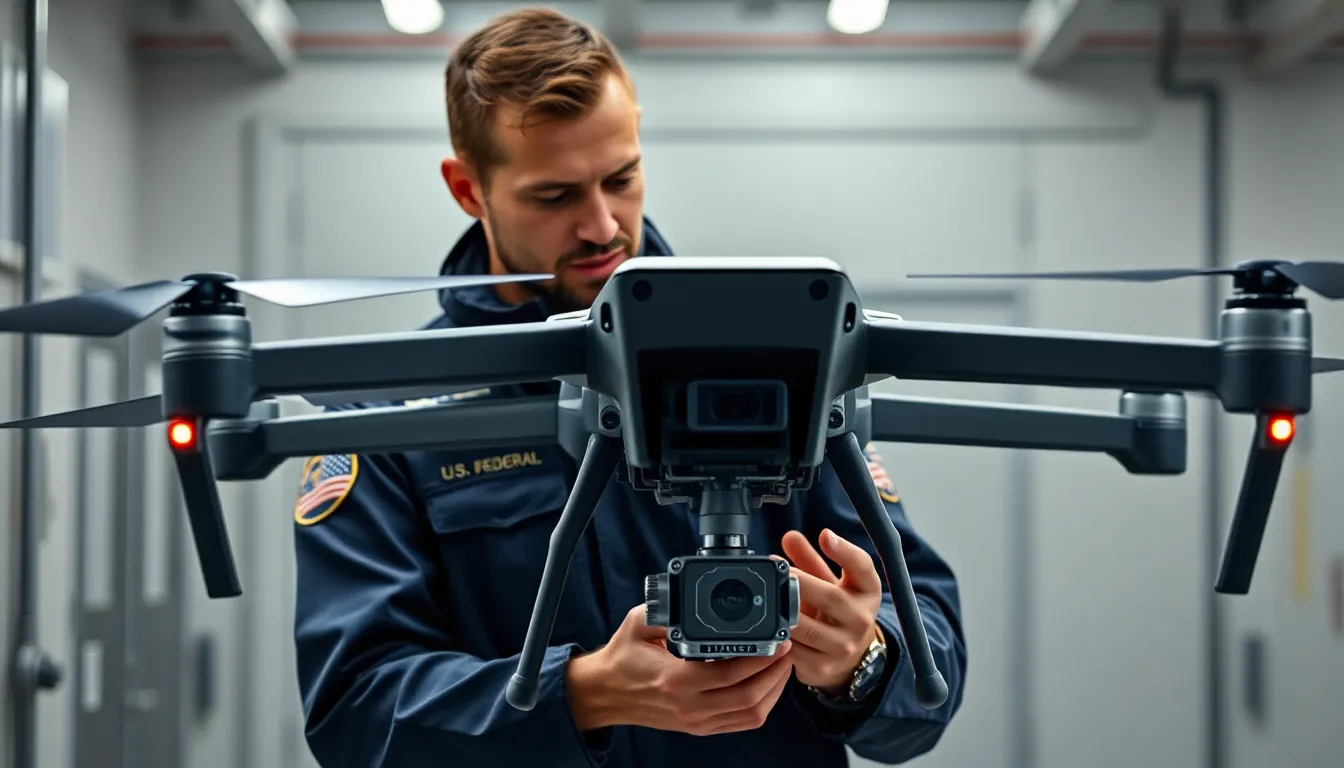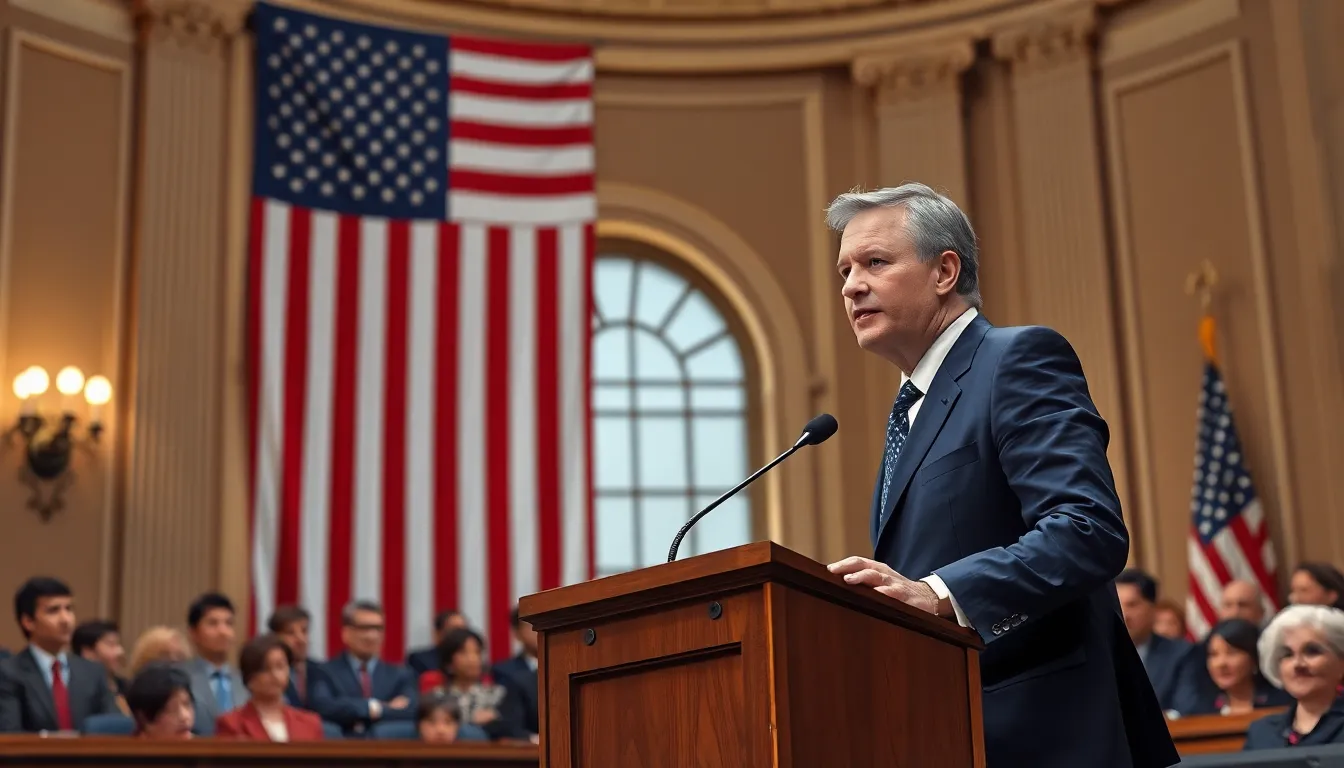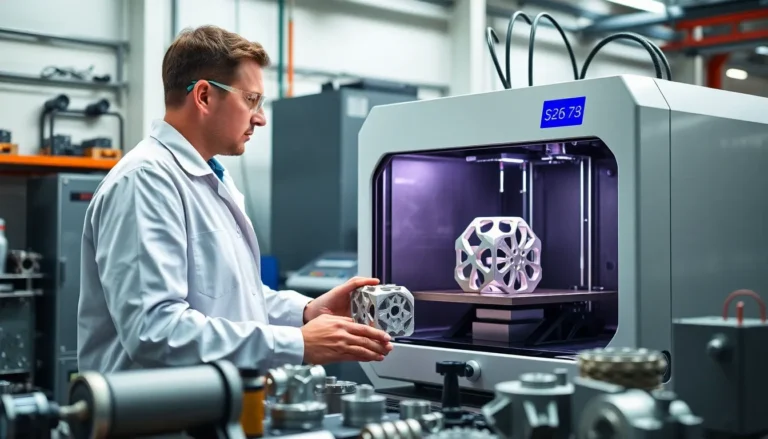In a world where drones buzz around like pesky mosquitoes, the “Countering CCP Drones Act” swoops in like a superhero ready to save the day. With concerns about privacy and security on the rise, this act aims to put a halt to the soaring ambitions of the Chinese Communist Party’s drone operations. It’s not just about keeping the skies clear; it’s about protecting national interests and ensuring that no one’s backyard becomes a landing strip for unwelcome surveillance.
As the stakes get higher, it’s time to dive into the nitty-gritty of this act. Who knew that countering drones could spark such a riveting debate? From the tech-savvy policy makers to the average citizen, everyone has a stake in this aerial showdown. Buckle up as we explore how this act aims to keep the skies safe and sound, and maybe even have a laugh or two along the way.
Table of Contents
ToggleOverview of Countering CCP Drones Act
The Countering CCP Drones Act addresses escalating privacy and security issues linked to drone activities associated with the Chinese Communist Party. This legislation aims to safeguard national interests by implementing stricter regulations on drone use, particularly in sensitive areas. Protection against unauthorized surveillance has become a critical focus as domestic and international concerns rise.
Legislators emphasize the act’s significance in maintaining the security of personal and public spaces. They argue that increased drone surveillance can lead to data privacy violations. The act outlines guidelines which regulate the types of drones that can operate near sensitive government facilities. Additionally, it fosters collaboration between federal agencies to enhance oversight.
Adopting this legislation reflects a proactive approach to counter potential threats posed by foreign drone operations. It creates consequences for those who evade regulations, deterring potential misuse. The act also promotes transparency by requiring drone operators to disclose their affiliations and purposes.
Stakeholders, including policymakers and advocacy groups, are actively engaged in discussions surrounding its implications. Deliberations often involve evaluating the balance between innovation in drone technology and national security needs. Critics raise points about potential overreach and the impact on legitimate commercial drone operations.
As the Countering CCP Drones Act moves forward, its specifics will continue to shape the debate. Observers watch closely to understand its full impact on drone regulations, privacy rights, and technological advancements. The ongoing dialogue ensures that various perspectives are considered, making the legislation a focal point in contemporary discussions on national security.
Key Provisions of the Act

The Countering CCP Drones Act outlines several key provisions to enhance national security. It specifically targets areas where unauthorized drone activities pose risks to privacy and safety.
Critical Technologies Addressed
The act prioritizes technologies that could facilitate foreign surveillance. Drones equipped with advanced imaging systems, data collection software, and communication tools are under scrutiny. Federal agencies will identify and categorize these technologies to implement necessary regulations. Recognizing the potential for misuse, the legislation mandates a review process for drone technologies that pose security concerns. Such measures aim to prevent unauthorized access to sensitive information and protect critical infrastructure.
Export Controls and Restrictions
Export controls play a significant role in maintaining national security. The act establishes clear restrictions on the export of drone technologies linked to foreign adversaries, especially those associated with the Chinese Communist Party. Regulatory agencies will enforce stringent licensing requirements for companies exporting drone-related technologies. Enhanced scrutiny ensures that sensitive advancements do not fall into the hands of those who may exploit them. This approach seeks to curb unauthorized use and promote responsible innovation within the drone industry while safeguarding sensitive information.
Impact on National Security
The Countering CCP Drones Act directly influences national security by addressing rising threats posed by drone operations linked to the Chinese Communist Party. Increased scrutiny of unauthorized surveillance emphasizes the importance of protecting critical infrastructure and personal privacy.
Threat Perception from CCP Drones
Drones operated by the CCP raise significant concerns regarding intrusion and espionage. Perceptions about these aircraft’s potential for surveillance create a climate of fear among citizens and policymakers. Understanding how advanced imaging systems and data collection tools work helps highlight the risks involved. The threat posed by foreign drones necessitates a response that involves proactive regulatory measures. Decision-makers focus on preventing misuse of technology that might compromise security and citizen privacy.
Enhancing U.S. Defense Capabilities
In response to drone-related threats, the act promotes advancements in domestic defense technologies. Strengthening U.S. defense capabilities involves collaboration among federal agencies tasked with monitoring and regulating drone operations. Improved coordination ensures effective identification of foreign surveillance tools. The legislation supports research and development of counter-drone technologies, which helps maintain technological superiority. Investing resources into enhanced detection systems significantly boosts strategic security. Each initiative under this act reinforces the U.S. commitment to safeguarding national interests against potential foreign adversaries.
Responses from the CCP
The Chinese Communist Party (CCP) has expressed strong dissent towards the Countering CCP Drones Act. This legislation provoked a range of reactions, reflecting the tense dynamics in international relations regarding drone operations.
Diplomatic Reactions
CP officials labeled the act as an unjustified intrusion into their affairs. They emphasize the significance of fostering global cooperation in technology while rejecting surveillance claims. Chinese diplomats argue that the legislation undermines trust between nations, calling for open dialogue to address mutual concerns. Furthermore, Beijing’s representatives warn that this act could lead to unintended diplomatic repercussions, challenging existing bilateral agreements about technology factors.
Military Adjustments and Developments
The CCP is actively enhancing its military drone capabilities in response to the act. Focus has shifted toward developing advanced unmanned aerial vehicles equipped with sophisticated surveillance features. Increased funding has been allocated for research to counter U.S. regulations and improve indigenous technologies. Reports indicate that drone deployment strategies are being refined, targeting regions deemed sensitive by U.S. intelligence. By prioritizing innovation, the CCP intends to maintain a competitive edge, ensuring its drone operations can navigate geopolitical tensions effectively.
Future Implications
Future implications of the Countering CCP Drones Act encompass various aspects of national security and technological advancement. Increased scrutiny on drone technologies directly affects companies developing advanced imaging systems. Federal agencies must evaluate how these technologies align with national interests while maintaining innovation.
Risks to personal privacy and safety continue to be a priority. Stakeholders emphasize the act’s role in preventing unauthorized surveillance, highlighting concerns about foreign drones gathering sensitive data. Effective regulation is essential for balancing growth in drone technology with the need for robust security measures.
Legislators aim to reinforce export controls surrounding drone technologies linked to adversarial states. This focus on stringent licensing requirements helps safeguard critical advancements from exploitation. Clear guidelines on drone operations near sensitive areas support more transparent oversight mechanisms, ensuring compliance across the board.
Critics of the act emphasize the potential impact on legitimate commercial drone operations. Maintaining an open dialogue remains crucial for addressing these concerns without stifling innovation. Policymakers must consider input from diverse groups to create a comprehensive regulatory framework.
Geopolitical tensions shape the context surrounding the act. The CCP’s responses indicate a commitment to enhancing military drone capabilities, which illustrates the broader impact of U.S. legislation on international relations. As the act develops, ongoing discussions among stakeholders will further refine its implications on both security and technology.
Each of these elements contributes to a more informed dialogue about drone regulations and their effects on privacy rights and national security. The act’s potential to reshape the landscape of drone technology and international relations warrants close attention from all involved parties.
The Countering CCP Drones Act represents a critical step in addressing national security concerns while navigating the complexities of drone technology. As stakeholders continue to engage in meaningful dialogue, the balance between innovation and security remains essential.
Legislators must consider the implications of strict regulations on legitimate commercial operations while ensuring robust safeguards against unauthorized surveillance. The act’s ongoing evolution will shape the future of drone regulations and their impact on privacy rights.
Ultimately, the commitment to protecting national interests against potential threats from adversarial states underscores the importance of vigilant oversight in this rapidly advancing technological landscape.





